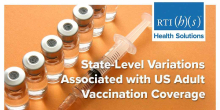Adult vaccination rates in the US are generally low and fall short of public health goals. Given the human and economic burden of vaccine-preventable disease, understanding the factors behind these low coverage rates is critical to improving participation.

Previous research has evaluated the effects of individual-level factors - such as demographics, health status, and barriers to care - on adult vaccination and found that these factors do have an impact on vaccination coverage. Recent research, sponsored by GSK and published in PharmacoEconomics – Open, evaluated the effects of both individual- and state-level factors on adult vaccination coverage. The key vaccines studied included seasonal influenza; pneumococcal; herpes zoster; and tetanus, diphtheria, and acellular pertussis.
Results suggested that state-level factors such as health insurance coverage, the authority of pharmacists to vaccinate, existence of vaccination exemptions, and participation in immunization information systems affect vaccination coverage, although the impact varied by vaccine.
Future research is needed to further explain the variations between states. However, results from this recent study provide policy decision makers at both state and federal levels with information to consider when expanding vaccination programs or preventive care efforts.
This research was coauthored by researchers from GSK and RTI Health Solutions. Full details of this research can be found at PharmacoEconomics - Open, doi: 10.1007/s41669-021-00262-x. To learn more about the methods used in this research, reach out to the RTI Health Solutions researchers below.
For more information on how we can assist with your vaccine research needs, click here.
